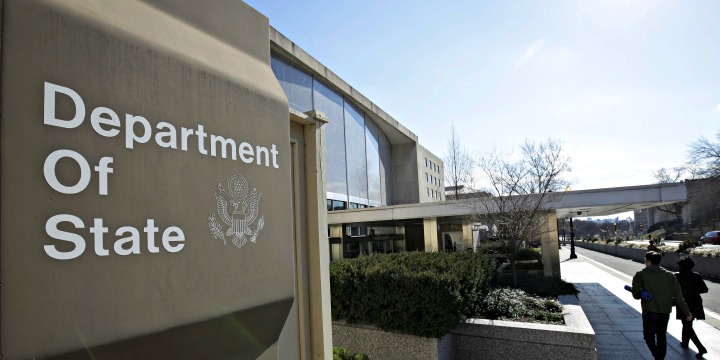Will Biden’s National Security Team Repeat Past State Department Mistakes?
 by Yoram Ettinger
by Yoram Ettinger
President Biden’s foreign policy and national security team reflects a resurgence of the State Department’s worldview. An examination of this worldview and its track record is required, in order to avoid past mistakes.
This track record consists of such critical issues as:
In 1948, the State Department led Washington’s opposition to the recognition of the newly established Jewish state, contending that the Jewish state would be helpless against the expected Arab military assault, might be pro-Soviet, would undermine US-Arab relations, destabilize the Middle East, threaten the US supply of oil, and more.
During the 1950s, the US courted Egyptian President Gamal Abdel Nasser, considering him a potential ally and extending non-military aid, while Egypt evolved into a key ally of the USSR, helped intensify anti-US sentiment among Arabs, and attempted to topple pro-US Arab regimes.
Throughout the 1980s, the US collaborated with Saddam Hussein in its effort to combat Iran, including intelligence-sharing, supply of dual use systems, and extending billions in loan guarantees. The assumption was that “the enemy of my enemy is my friend.”
This US policy was perceived by Saddam as a green light for Iraq’s invasion of Kuwait, as documented by the meeting between Saddam and the US Ambassador to Iraq, April Gillespie, eight days before the invasion.
During the 1990s, the US hailed Yasser Arafat as a messenger of peace, worthy of the Nobel Prize and annual US foreign aid, ignoring his annihilationist vision, as reflected by his 1959 and 1964 Fatah and PLO charters, hate-education system, and intensified terrorism.
Until the eruption of the 2011 civil war in Syria, many in the State Department considered Bashar al-Assad a reformer and a potential moderate due to his background as an ophthalmologist in London, his marriage to a Western wife, and other issues.
In 2011, the Washington, DC foreign policy and national security establishment welcomed the tectonic eruption of violence on the Arab Street as a march toward democracy, progress toward peaceful coexistence, and a path to democracy and freedom. However, a reality check demonstrates that the Arab Spring has been a ruthless Arab Tsunami, exposing endemic intra-Arab and intra-Muslim terrorism, subversion, and violent power struggles.
In 2015, irrespective of Iran’s core fanatical, repressive, and megalomaniacal ideology and systematic perpetration of war and terrorism, the architects of the Iran nuclear accord (JCPOA) provided Iran’s ayatollahs with billions of dollars to bolster their ballistic, terroristic, and global expansionist machine. They were guided by the assumption that the ayatollahs were partners for negotiation, and amenable to peaceful coexistence and influence-sharing with their Arab Sunni neighbors. Moreover, the US disappointed most Iranians by renouncing a regime change option against the ruthless and lawless despots in Tehran.
In view of the aforementioned track record — which highlights a systematic gap between Middle East reality and State Department policy — President Biden’s Middle East team may benefit from the studies of the late professor Elie Kedourie (London School of Economics and Political Science), an iconic Middle East historian, whose politically incorrect books and articles have been vindicated by Middle East reality.
In 2021, 10 years following the eruption of the Arab Tsunami — and contrary to the expectations of the State Department — the Arab street is still dominated by its intrinsic 1,400-year-old instability, unpredictability, violent intolerance, human rights squashing, despotism, intra-Arab and intra-Muslim wars, and violence.
Such a policy failure is attributed — if one employs professor Kedourie’s studies — to “successive and cumulative manifestations of illusion, misjudgment, maladroitness, and failure.”
Will President Biden’s foreign policy and national security team, dealing with Iran’s ayatollahs and the Middle East at large, learn from past critical errors by avoiding them — or will they repeat them? At stake is regional and global stability, including the national security and homeland security of the US.
Yoram Ettinger is a commentator and former Israeli ambassador.
 Palestinian Prime Minister Announces New Reform Package
Palestinian Prime Minister Announces New Reform Package France: Man Suspected of Abducting, Raping Jewish Woman ‘to Avenge Palestine’
France: Man Suspected of Abducting, Raping Jewish Woman ‘to Avenge Palestine’ Israel Intensifies Strikes Across Gaza, Orders New Evacuations in North
Israel Intensifies Strikes Across Gaza, Orders New Evacuations in North Iran Threatens to Annihilate Israel Should It Launch a Major Attack
Iran Threatens to Annihilate Israel Should It Launch a Major Attack ‘Completely Baseless’: Reports of Mass Graves at Gaza Hospitals are False, IDF Says
‘Completely Baseless’: Reports of Mass Graves at Gaza Hospitals are False, IDF Says Columbia University Shutters Campus as Jews Fear for Safety, Critics Call for President to Resign
Columbia University Shutters Campus as Jews Fear for Safety, Critics Call for President to Resign ‘Hamas, We Love You!’ A List of the Chants, Statements From Columbia University’s ‘Gaza Solidarity Encampment’
‘Hamas, We Love You!’ A List of the Chants, Statements From Columbia University’s ‘Gaza Solidarity Encampment’ ‘Useless Pigs’: Anti-Israel Demonstrations Rage at Yale University, Forcing Police Intervention
‘Useless Pigs’: Anti-Israel Demonstrations Rage at Yale University, Forcing Police Intervention Anti-Israel Protesters Interrupt Chelsea Handler Comedy Show Because of Her Support for Jewish State
Anti-Israel Protesters Interrupt Chelsea Handler Comedy Show Because of Her Support for Jewish State Israeli Hostage Families Make Passover Plea for Return of Missing Loved Ones
Israeli Hostage Families Make Passover Plea for Return of Missing Loved Ones




 ‘Completely Baseless’: Reports of Mass Graves at Gaza Hospitals are False, IDF Says
‘Completely Baseless’: Reports of Mass Graves at Gaza Hospitals are False, IDF Says Iran Threatens to Annihilate Israel Should It Launch a Major Attack
Iran Threatens to Annihilate Israel Should It Launch a Major Attack Israel Intensifies Strikes Across Gaza, Orders New Evacuations in North
Israel Intensifies Strikes Across Gaza, Orders New Evacuations in North France: Man Suspected of Abducting, Raping Jewish Woman ‘to Avenge Palestine’
France: Man Suspected of Abducting, Raping Jewish Woman ‘to Avenge Palestine’ Palestinian Prime Minister Announces New Reform Package
Palestinian Prime Minister Announces New Reform Package